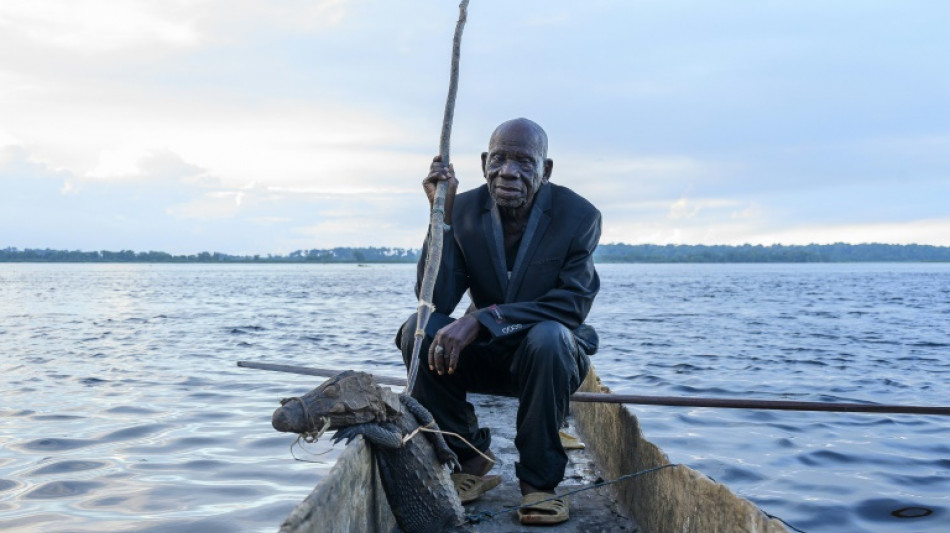
-
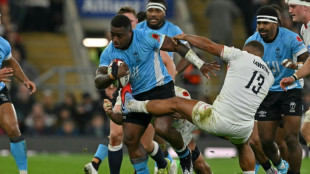 Fiji unchanged for France Autumn Nations Series trip
Fiji unchanged for France Autumn Nations Series trip
-
All Blacks boss Robertson at ease with 'respectful' England challenge to haka

-
 Stocks on the slide despite end of US shutdown
Stocks on the slide despite end of US shutdown
-
Church bells ring as France marks decade since Paris attacks

-
 France scrum-half Serin commits for two more seasons to Toulon
France scrum-half Serin commits for two more seasons to Toulon
-
Starlink, utilised by Myanmar scam centres, sees usage fall nationwide
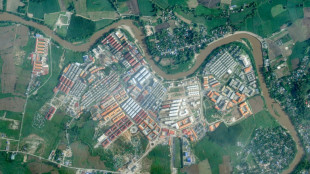
-
 YouTube superstar MrBeast opens pop-up park in Saudi Arabia
YouTube superstar MrBeast opens pop-up park in Saudi Arabia
-
'Black Klimt' steps out of shadows and into political tug-of-war
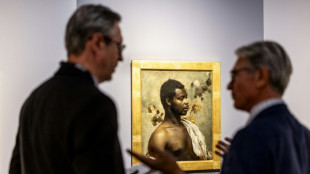
-
 Study flags 'complicity' of oil-supplying states in Gaza war
Study flags 'complicity' of oil-supplying states in Gaza war
-
US shutdown scorecard: Who cashed in, who crashed out

-
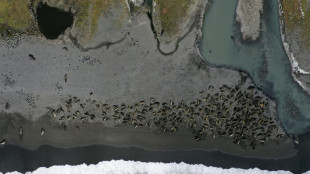 'Bleak' future for seals decimated by bird flu, scientists warn
'Bleak' future for seals decimated by bird flu, scientists warn
-
Australia turn to O'Connor in search of Ireland inspiration
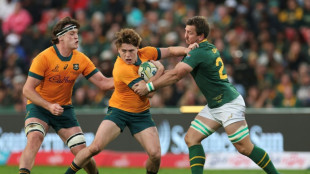
-
 Mexican car industry fears higher tariffs on China will drive its demise
Mexican car industry fears higher tariffs on China will drive its demise
-
Battle brews over Australia or Turkey hosting next COP

-
 Hansen and Prendergast start for Ireland against Australia
Hansen and Prendergast start for Ireland against Australia
-
McIlroy two shots off the lead as Kim top after round one in Dubai

-
 Stocks sluggish as US government shutdown ends
Stocks sluggish as US government shutdown ends
-
De Minaur knocks out Fritz to keep ATP Finals hopes alive

-
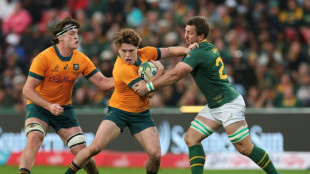 Ikitau and O'Connor return as Wallabies make changes for Ireland
Ikitau and O'Connor return as Wallabies make changes for Ireland
-
EU backs small parcel duties to tackle China import flood

-
 Europe court orders Poland pay damages to woman who aborted abroad
Europe court orders Poland pay damages to woman who aborted abroad
-
EU lawmakers back proxy voting for pregnant women, new mothers

-
 England great Anderson to play on for Lancashire
England great Anderson to play on for Lancashire
-
Swiss economy minister back in Washington for tariff talks
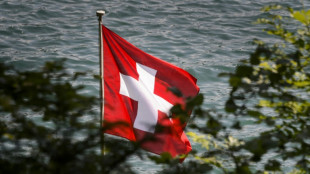
-
 Race for first private space station heats up as NASA set to retire ISS
Race for first private space station heats up as NASA set to retire ISS
-
France lifts travel ban on Telegram founder Durov

-
 Quesada sticks with Italy's Wallabies heroes for Springboks Test
Quesada sticks with Italy's Wallabies heroes for Springboks Test
-
Amazon robotics lead casts doubt on eye-catching humanoids

-
 Springboks ring changes for Italy clash
Springboks ring changes for Italy clash
-
How embracing 'ickiness' helped writer Szalay win Booker Prize

-
 World oil market 'lopsided' as supply outpaces demand: IEA
World oil market 'lopsided' as supply outpaces demand: IEA
-
Alldritt 'takes up the torch' for France against Fiji after South Africa loss

-
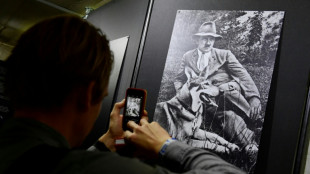 Hitler likely had genetic condition limiting sexual development: research
Hitler likely had genetic condition limiting sexual development: research
-
Zelensky sanctions associate as corruption scandal engulfs Kyiv

-
 Germany agrees to keep military service voluntary
Germany agrees to keep military service voluntary
-
Japan PM Takaichi says she sleeps only 2-4 hours a night
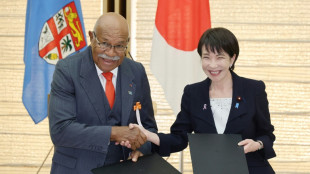
-
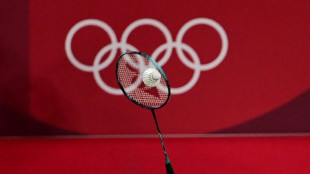 South Africa announces plan to bid for Olympic Games
South Africa announces plan to bid for Olympic Games
-
Juan Ponce Enrile, architect of Philippines martial law, dies at 101
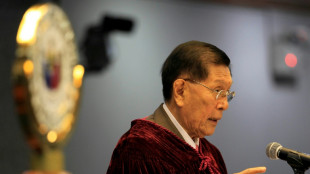
-
 Stocks waver as US government shutdown ends
Stocks waver as US government shutdown ends
-
Google to pay millions to South African news outlets: watchdog

-
 EU probes Google over news site rankings despite Trump threats
EU probes Google over news site rankings despite Trump threats
-
Pakistan grants lifetime immunity to president, current army chief

-
 South Africa's Bavuma says winning in India top ambition
South Africa's Bavuma says winning in India top ambition
-
Alldritt back to captain France against Fiji after South Africa loss

-
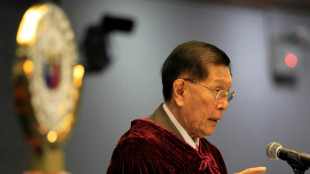 Juan Ponce Enrile, architect of Philippine martial law, dies at 101: daughter
Juan Ponce Enrile, architect of Philippine martial law, dies at 101: daughter
-
'Ready' Rees-Zammit back in Wales's starting team to face Japan

-
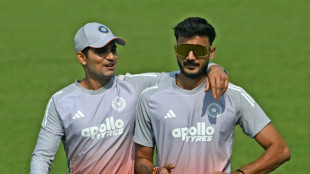 Spinners decide Tests in India, Gill says before South Africa opener
Spinners decide Tests in India, Gill says before South Africa opener
-
K-pop group NewJeans ends feud with record label ADOR

-
 Asian stocks rise with focus on Fed, tech as US government reopens
Asian stocks rise with focus on Fed, tech as US government reopens
-
UK economic gloom deepens before budget

| RBGPF | -0.06% | 78.47 | $ | |
| CMSD | -1.07% | 24.29 | $ | |
| NGG | 0.51% | 78.428 | $ | |
| RYCEF | -0.47% | 14.96 | $ | |
| BTI | -2.07% | 54.69 | $ | |
| RIO | 0.42% | 71.41 | $ | |
| SCS | 0.06% | 15.76 | $ | |
| RELX | 0.37% | 41.515 | $ | |
| CMSC | -0.77% | 23.895 | $ | |
| GSK | 0.89% | 48.5 | $ | |
| AZN | 1.48% | 89 | $ | |
| JRI | -0.42% | 13.812 | $ | |
| BCC | 0.13% | 70.37 | $ | |
| BP | -0.38% | 36.72 | $ | |
| VOD | 0.76% | 12.465 | $ | |
| BCE | 0.78% | 22.95 | $ |

Crocodile hunting wanes but legends live on in DR Congo
The fearsome slender-snouted crocodile can make torch lights explode just with its eyes -- so the legend goes in the Democratic Republic of Congo.
Along the Congo River, such myths stay with the Banunu fishermen, even if their traditions and livelihoods are not what they once were.
Michel Koko, known as Lebe, 52, has been a fisherman for 10 years following in his father's footsteps.
His hunting successes include crocodiles of all sizes, caimans, monitor lizards which can grow to more than three metres (yards) long, as well as all kinds of fish.
At 4,700 kilometres (2,920 miles) long, the Congo is the second longest river in Africa after the Nile.
Koko is Libinza, a tribe related to the Banunu-Bobangi, who since the 18th century have lived on the banks of the river in northwestern Equateur province and Mai-Ndombe province near the capital Kinshasa.
The tribe is known for its extraordinary fishing and hunting superstitions.
"My father left me his spear," Koko said, convinced it is why he almost never misses his target.
Banunu fishermen often inherit spears and ancestral totems believed to have spiritual significance.
But their elders also bequeath them their "clairvoyance".
With the help of palm wine, makasu kola nuts or mondongo bush fruits, they claim to be able to see into the future.
"If they see only death, they won't hunt that day," Koko says, in Mbandaka, the capital of Equateur province and about 700 kilometres (435 miles) upstream from Kinshasa.
He has a deep knowledge of crocodiles. He knows how to communicate with them, attracting them by imitating their cries, he said.
The "mbama" crocodile with a long snout responds by pouring water out of his mouth.
"That's the moment to deliver him the fatal blow," Koko said.
But, with the short-snouted "ngando", it is more complicated.
"You have to position yourself in the middle of the pirogue (dugout canoe) because he can appear from anywhere," the hunter continued.
The animal possesses "infrared vision" and can deliver an electric shock, he said.
"If a crocodile bites you, it is important not to scream," Koko warned.
"If you say nothing, he will think you are a tree trunk and let go."
- Like gold in bygone days -
At the age of 91, Papa Baron Missiki reminisces on his days hunting crocodiles, as well as buffalos, antelopes, elephants and hippopotamuses.
He is now retired but his son, also called Missiki, keeps up the tradition.
With pride for their community and their experience, the fishermen become nostalgic recounting their tales from years gone by.
Koko remembers a time when crocodile hunting was lucrative, back when the DRC was known as Zaire between 1971 and 1997.
President Mobutu Sese Seko was in power and crocodile skin was sought after for its supposed miraculous qualities such as protecting families against evil spirits, but also for use in the fashion industry.
"We would leave to go hunting with bags of salt in the pirogue to ensure the conservation of their skin," Koko said.
"It was (like) gold at the time, we didn't care about their flesh."
Nowadays, the selling of wild crocodile skin "is forbidden" to preserve the species, adds the fisherman.
He says animal numbers have dwindled on the river, which he puts down to overfishing, climate change and increased numbers of motorised boats on the waterway.
"We can only hunt the dwarf crocodile called 'ngokia' (locally) and sometimes the monitor lizard" known as the mbambi, Koko said.
"Seeing how easily dwarf crocodiles reproduce, it is impossible this species will disappear," he commented.
To keep their heads above water financially, the fishermen take up jobs in local businesses, trade or invest in fish farming.
"How do we live without selling wild animals?" asked Lucie, a vendor at Lingunda market in Mbandaka.
"It enables us to pay for the children's school, the rent, everyday life."
O.Karlsson--AMWN


